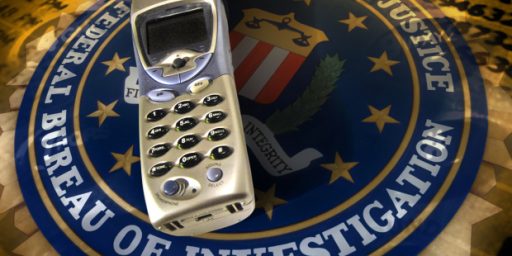Democrats Cave on Surveillance Bill
The Democrats have backed down in their fight with the administration over domestic surveillance.
Senate Democrats and Republicans reached agreement with the Bush administration yesterday on the terms of new legislation to control the federal government’s domestic surveillance program, which includes a highly controversial grant of legal immunity to telecommunications companies that have assisted the program, according to congressional sources. Disclosure of the deal followed a decision by House Democratic leaders to pull a competing version of the measure from the floor because they lacked the votes to prevail over Republican opponents and GOP parliamentary maneuvers.
The collapse marked the first time since Democrats took control of the chamber that a major bill was withdrawn from consideration before a scheduled vote. It was a victory for President Bush, whose aides lobbied heavily against the Democrats’ bill, and an embarrassment for House Speaker Nancy Pelosi (D-Calif.), who had pushed for the measure’s passage.
The draft Senate bill has the support of the intelligence committee’s chairman, John D. Rockefeller IV (D-W.Va.), and Bush’s director of national intelligence, Mike McConnell. It will include full immunity for those companies that can demonstrate to a court that they acted pursuant to a legal directive in helping the government with surveillance in the United States. Such a demonstration, which the bill says could be made in secret, would wipe out a series of pending lawsuits alleging violations of privacy rights by telecommunications companies that provided telephone records, summaries of e-mail traffic and other information to the government after Sept. 11, 2001, without receiving court warrants. Bush had repeatedly threatened to veto any legislation that lacked this provision.
Senate Democrats successfully pressed for a requirement that the Foreign Intelligence Surveillance Court review the government’s procedures for deciding who is to be the subject of warrantless surveillance. They also insisted that the legislation be renewed in six years, Democratic congressional officials said. The Bush administration had sought less stringent oversight by the court and wanted the law to be permanent.
Immunity for the telecoms here is essential. Whatever one’s views on the wisdom or even legality of the federal government conducting domestic surveillance without a warrant, the idea that companies complying with the orders of the people who approve their license in matters of national security would then have to fend off private lawsuits is obviously absurd. If someone should be subject to lawsuits, it’s the policy-makers who ordered the surveillance.
The Democrats win, though, on the important issues of FISA Court review and sunsetting. Both strike me as major improvements in the old policy, although my understanding is that the former has become the de facto policy, anyway, after the initial uproar over the previous practice.





The current laws have exceptions for “good faith” compliance with orders of the gov’t, but a judge has already ruled that no reasonable person could have thought in “good faith” that the surveillance asked for by the gov’t was legal. And it’s not like these guys are hiring Larry the Sole Proprietor Lawyer Guy for legal advice. And note that recent reports have this starting prior to 9/11 and that Qwest did refuse to participate (at least initially) and still has its license today.
So pardon me if I don’t have sympathy for large corporations who knowingly break the law for years in order to improve their bottom line (via awards of multi-million dollar gov’t contracts to the compliant telcos) when they get caught and sued. This might (might) be more palatable if Congress ponied up the money to pay, say, 80% of any damages eventually won by the plaintiffs to acknowledge the gov’ts complicity in this.
And why should they get immunity if we never get to find out exactly what they did in the first place?
I think it would be hard for you to be more wrong here, James. You’ve got the structural imperatives exactly backwards. It’s because the executive has so much power over the economic livelihood of the telcos that the countervailing threat of possible lawsuits is essential to preserving the civil liberties of citizens. If the government is the only thing the telcos fear, they will only trim their behavior to please the government. And we know that the government can’t be trusted, ever.
“Democrats cave.” Is that news, really?
Score: Big Business Government – 1, Joe Citizen – 0.
In the end the courts will deal with the issue either way. Of course, we seem to have the best Supreme Court money can buy.
This bill, if it becomes law, just makes it easier for the telecom lawyers to find another loophole to wiggle through. Verizon, ATT, et al, are guilty of conspiring to violate our 4th Amendment rights. The high priced legal advice they pay for by the year surely told them they were vulnerable to lawsuits from their customers if they complied with these legally dubious orders. The Senate just stacked the deck to help them get away with it. The corporatacracy is alive, well, & growing.
Having companies risk lawsuits for complying with government directives is just asinine. The way to protect civil liberties is 1) for citizens to be vigilant and 2) for checks and balances to work.
Indeed, that’s what worked here, ultimately. The press made the public more aware and put pressure on Congress. There were also lawsuits and resulting legal rulings that bound the executive.
Having companies risk lawsuits for complying with government directives is just asinine. The way to protect civil liberties is 1) for citizens to be vigilant and 2) for checks and balances to work.
(1) Civilians can’t be vigilant about top-secret programs.
(2) Checks and balances don’t work when the executive keeps its acts secret and when the Congress is of the same party as the President.
Wasn’t the telco story broken by illegal leaks to the media? Is *that* what we’re supposed to rely on?
Does OTB really endorse the policy that “if the tsar says it’s okay, then it’s not illegal”?
And how exactly is is due process of law for retroactive immunity to be applied like this?
The tsar saying it’s okay doesn’t make it legal for the tsar. But, yes, it makes it legal for the serfs.
And, yes, I agree that a secretive, recalcitrant Executive is difficult to restrain when it’s claiming “national security.” I’m not sure that post hoc lawsuits against private companies caught in the middle make that any less so.
Serfs. James, you just had a moment of clarity. Welcome to the ownership society. And guess who’s asses are the ones that are owned. (a hint, both of us are sitting on one)
I’m not sure that post hoc lawsuits against private companies caught in the middle make that any less so.
Au contraire. Imagine 15 years from now, when President Chelsea Clinton is demanding that the telcos assist her in surveillance against the underground resistance led by Hugh Hewitt.
If they think, “hey, we did this under Bush the Second, and we got hit for A BILLION BUCKS IN FINES,” then they will be much, much more likely to say “uh, Ms. President, we need a court order for that.”
Companies certainly should have to risk lawsuits for complying with plainly illegal and likely unconstitutional requests from the executive branch. If Blackwater assassinates a U.S. citizen after a request from the President, when it’s sued by the citizen’s family for damages it can just go “Bush said it was ok” and walk away? That’s really the country you think you live in (and apparently think is just fine)?
If Blackwater assassinates a U.S. citizen after a request from the President, when it’s sued by the citizen’s family for damages it can just go “Bush said it was ok” and walk away?
Damn, I think I can count 4 votes on the Supreme Court affirming that proposition. I miss my country.
“The tsar saying it’s okay doesn’t make it legal for the tsar. But, yes, it makes it legal for the serfs.”
Except that all the law-enforcement officials are also serfs, relative to the tsar. So its a system where the tsar rules by decree. Or, to put it the common parlance, the unitary executive.
Really have to disagree here James. I would want the corporate executives to be in the position of telling the government official – sorry, I have to check with my legal people to see if its ok. If the government is in the position to say “don’t worry your pretty head about the law, we got you covered”, then you really invite tyranny. How easy is it really to impeach and remove a president? That would be the only recourse, because obviously the administration wouldn’t prosecute itself. Well, at least not this administration.